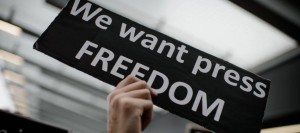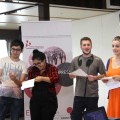The European Union (EU) won’t be complete without the full integration of the Balkan region – say most of the European leaders when talking about the future of the EU. As stated in the recent Vienna Summit – within the Berlin process initiated by German Chancellor Angela Merkel, the Balkan countries are in a need of a bigger economical impulse, which will be of course given to them as soon as they reach their destination – a full membership in the EU. In a meanwhile, press freedom continue to deteriorate.
Times have been more or less tough on the region, regarding its accession to the EU. In particular, the Balkan countries have reached a various level of progress in recent years.
Montenegro for example, has been the leading candidate country from the region so far, opening the negotiations in late 2013. Macedonia has been a candidate country for almost a decade, and one of the first from the region to gain the candidate status, but has yet to open the negotiations with the EU, because of ongoing name dispute with a member country – Greece. Bosnia and Herzegovina is expected formally to submit its application for a full membership in the Union at the beginning of 2016.
Aside from the European aspirations, one more thing that these three countries have in common is the general lack of media freedom, for which the European Commission states that is ‘a key indicator of a country’s readiness to become part of the EU, because it implies a commitment to democracy, good governance and political accountability’.
Montenegro – On a speedboat towards the EU, but facing many waves
The level of media freedom in Montenegro can be understood best through various researches and polls done by international organizations. Namely, the Reporters without borders, in its annual report for 2015 puts Montenegro in 114th place, out of 180. This situation should be alarming for every media worker in Montenegro, because it puts the country in the company of countries like South Sudan, Nigeria, in which the terrorist organization Boko Haram roams, and Tunis, a country which since the Arab spring, hasn’t recovered the situation in its media sector. A concerning detail is that Montenegro used to be on the 53rd place on the same list in 2008. For the past seven years, the progress that Montenegro made in the European integration, is marred by the limitations of the media freedom. Reasons for this should be found in the number of physical attacks on journalist and their property, financial and political pressure, as well as the editorial policy, which generates self censorship.
The report that was made by the Freedom House looks more optimistic, and for the year 2015, it places Montenegro on 79th place, which is ahead of all of the Balkan countries, but still in the category ‘partly free countries’. The Freedom House states that the level of media freedom in Montenegro has been jeopardized since the reelection on prime minister Milo Djukanovic. As its stated in the report, this political event caused a lot of physical attacks and lawsuits against journalists and medias that aren’t ready to blindly accept the official policy of the country.
Just like the international organizations, Montenegrin journalists name few major reasons that have cause the poor level of media freedom. Zeljko Ivanovic, editor-in-chief of the independent newspaper Vijesti states that there is a difference between the real independent media and the rest, which is the main difference between the media that is dependent on the government structures and ones who oppose those structures.
“The first and basic difference that causes the independent media to be dedicated to its profession and work – is to inform the citizens and to protect the public interests. The others are dedicated to misinform and lie the citizens and to protect the private interests of a small number of people”, says Ivanovic. He also states that there are other direct reasons that make the difference between the independent media and the rest.
“The former are influential and have high circulation, while the latter are minor and meaningless. The first type are the ones who are on the market and depend on the circulation and the income from the marketing, while the second type are dependent on the state budget and black funding. The first type are also being attacked and persecuted, while the second type are governments favorites”, adds Ivanovic.
The meaning of the economical aspect for the development on one hand, and the destruction on the other for media freedom is stated also by Nikola Markovic, vice editor-in-chief of the newspaper Dan. According to Markovic, “the state, through the imposed ban on commercials for state companies, public institutions and the sending of inspections, and on the other hand with the budget financing of the favorite media, is trying to economically destroy the independent media”.
Even from a physical distance, the economical pressure on the media can be witnessed, states British media analyst Jack Holland.
“As a neutral observer I can say that I witnessed an unjust allocation on budget funds, and also the fact that most of those funds go to media which are close to the authorities. In this way, things are made much more difficult for most of the journalists, and the existence of certain media are being brought into question. The freedom of media should rest on the equality for everyone”, says Holland.
Concerning the process of European integration, a lot of reports which are coming from relevant international and national organizations are suggesting that Montenegro does not fulfill the media freedom criteria, and annual reports from Brussels often state that the authorities need to have a clear investigation on journalist attacks (the murder of journalist Dusko Jovanovic is often referred as the most serious example). Nevertheless, should Montenegro keep its steady course towards the EU, a lot of work needs to be done in the field of the media freedom, but also for the journalism as a profession, which is starting to lose its credibility in the eyes of the public.
Macedonia – Lack of media freedom, lack of European progress
Since gaining the candidate status in 2005, the level of media freedom in Macedonia has been constantly deteriorating. Journalists have been attacked, imprisoned, whole TV stations and newspapers have been shut down for various reasons. According to Macedonian journalists, the problem in the media sphere in the country is mainly because of the political and business influence that the media are thrown in.
“Generally speaking, the media in Macedonia are, to say in the mildest way possible, partially free and this mild assessment is due to the fact that there are few media – TV stations, newspapers and web portals, which are trying to be independent and professional. But still, a large number of the media, mostly TV stations, which are considered as a mainstream media and have the biggest rating and influence with the public, are dependable on the centers or power, either the business or political centers of power, and these two factors most of the times are interconnected”, says Vlatko Stojanovski, a journalist for the weekly newspaper Fokus.
According to Stojanovski, the political agreement that was recently signed in the country by the leading political parties, promises to tackle the media issue, which is a big part of the European aspiration that the country has.
“The biggest defect when talking about the situation in the media is the effort that the government is making to corrupt them, which happens with the government commercial funding, which is going only to a few selected medias. Also there is the access to the public funds, which is made available only to the owners of these mediums, as well as to some of the editors. Because of this, the situation in the media is getting a lot of critiques from the reports that most international organizations are doing on the country. This issue was also present in the negotiations about the resolving of the political crisis in Macedonia, which ended in a agreement between the political parties, which amongst other things, consists of a plan for an intervention in the media sphere, and to be more precise, in the public media service”, adds Stojanovski.
Various international organizations have done reports on media freedom in Macedonia, and most of them agree that the situation is getting from bad to worse. The Reporters without borders places Macedonia in the 117-th place out of 180 countries, while Freedom House for 2015 gives the country a score of 58, which according to this index, makes Macedonia the worst country in the Balkan region. Journalist Milena Gorgievska from the daily newspaper Vest considers this to be a important problem for the country’s path to the EU and the NATO.
“The last report from the Freedom House on media freedom in Macedonia showed that the country has the lowest level of media freedom in the Balkans, because of the restrictive laws and the violence against journalists. It was noted in the report that in the last ten years, Macedonia has lost ten points on this scale, mostly because of the pressure from the business owners on the critical reporting, pro-government politics in the public media service, political pressure on editors. All these problems are leading to self censorship. Continued efforts on limiting the freedom of media have been also noted in the State department’s report on human rights in 2014. All of these facts are a statement on the media situation and their opportunity for critical reporting on the daily politics in the country, including the European and the Euroatlantic integration of Macedonia. Reforms in the media sector are one of the key reforms that are needed for a membership in the EU. A big problem for the general media situation in Macedonia is the low level of professionalism in the journalistic profession, this affecting the print and the electronic media together. In this sense, I think that an improvement in the capacities for the professional journalistic standards is much needed. Also, there is a strong need for an education of how journalists can `influence` the government and the governmental institutions for an efficient upholding of the law for access to public information”, says Gorgievska.
Foreign correspondents have also had difficulties while working in Macedonia, and such is the experience of Al Jazeera’s journalist Stefan Goranovic, who notes the problems when trying to get an official statement from the government representatives.
“Countries from the region, including Macedonia, have a relatively bad score when talking about media freedom. Working in Macedonia several times, I have noticed that it’s extremely difficult to get a statement from the government representatives. Media freedom lacks in three particular countries from the Balkans, those are Macedonia, Serbia and Montenegro. In Serbia there are situations when some informative television shows are `gone in a night`, and in Macedonia, TV stations have been shut down, and there is constant pressure over newspapers and web portals”, concludes Goranovic.
Bosnia & Herzegovina – Ready to make concrete steps towards EU, but facing lots of difficulties
 For Bosna & Hercegovina (BiH), things in recent years, concerning the Euro-integration process, have gone from bad to worse. Amidst the political chaos in the country, and problems in judiciary like the implementation of the Sejdic – Finci court ruling, which seems to take forever and deeply undermines the European agenda, the level of media freedom only adds to the country’s woes. Nevertheless, Bosnia & Herzegovina seems willing and ready to submit its application for a full membership in the EU, and this should happen at the beginning of 2016.
For Bosna & Hercegovina (BiH), things in recent years, concerning the Euro-integration process, have gone from bad to worse. Amidst the political chaos in the country, and problems in judiciary like the implementation of the Sejdic – Finci court ruling, which seems to take forever and deeply undermines the European agenda, the level of media freedom only adds to the country’s woes. Nevertheless, Bosnia & Herzegovina seems willing and ready to submit its application for a full membership in the EU, and this should happen at the beginning of 2016.
Just like Macedonia, in the 2015 report by the Freedom House, Bosnia & Herzegovina has been placed into the ‘Partly free countries’ group, with problems like legal pressure on journalists and the labeling of criticism of the government as hate speech being one of the biggest problems.
For Bosnian journalists, the biggest problems in media sector come from the economical standpoint, because the economical influence tends to impose pressure on most journalists, who are forced to choose between professionalism or getting paid.
“Concerning media freedom, from my experience, it depends on the media that you are working for, whether you are working for a private media or a media that has a certain party that is backing them, you will always have troubles with pressures and someone will always control your work. If you are working for an independent media that has foreign funding, the situation is completely different and you have bigger freedom of speech and you can write your reports or articles as you like, with no one bothering you. But this also means that you need to work professionally, so no one can tell you that you are being subjective on the topic. If you do your job professionally and ethically, then there won’t be any problems”, says Natasa Tadic, a reporter for the N1 Regional TV, speaking for the radio show `Council for Press in BiH`.
Media now have more freedom than they used to back in the old, Yugoslavian system, says Bosnian journalist Admir Muslimovic, but highlights the economical influence that is present and always lures over the Bosnian media.
“We can look at the situation with the media freedom in Bosnia & Herzegovina from two points of view. You can say that the media now have more freedom than they used to have in the past, in the past system that existed in Yugoslavia. On the other hand, the media are not free because they are economically dependent. This is a problem for most media in BiH, so in a way, the economy has a big influence on media freedom. I also think that there is a lot of pressure on journalists, because no one should make you do something that you don’t want to. Journalists are being deployed into certain media houses. No one can make me work for some newspaper that doesn’t have the same views as I do”, says Admir Muslimovic, editor-in-chief at B portal.
Muslimovic also lists media regulations as a big problem in the country, because “nowadays anyone can start a online portal, without any criteria or control”.
The European Commission’s annual reports state media freedom is one of the biggest challenges that Balkan countries need to overcome in their path towards the EU (thou, paradoxically one can hardly read about it in the media), yet the worsening of the situation in these countries seems to have gone unnoticed in a way. It seems that the EU eventually sidelines press freedom in the name of political expediency or economic and strategic interests (as the Committee to Protect Journalists report rightfully notices). Still there is a hope that political will for more serious criticism and reaffirmation of media freedom as a human right is yet to come from the West. Macedonia gets a recommendation for opening the accession talks every year, and Montenegro keeps opening various chapters from the negotiations. Bosnia has been less successful in the European integration so far, but the same question remains for all three countries – will they use the situation in the media as an obstacle, or as a stepping stone towards the EU?
By:
Luka Nikolic
Bojan Stojkovski
Semir Mustafic
The article is part of the outputs of the European Youth Press’ project “Making Twitter Length News: media literacy in digital media”. The article has not been edited and it doesn’t necessarily represents editorial policy of the EYP.





4 Comments